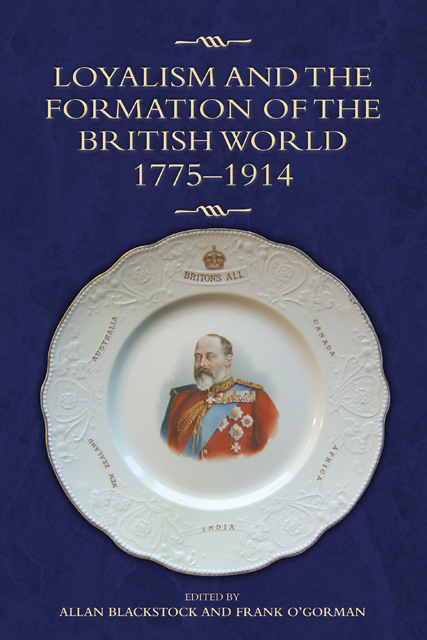Book contents
- Frontmatter
- Contents
- Notes on Contributors
- 1 Loyalism and the British World: Overviews, Themes and Linkages
- 2 Origins and Trajectories of Loyalism in England, 1580–1840
- 3 The ‘Spirit of Loyalty’: Material Culture, Space and the Construction of an English Loyalist Memory, 1790–1840
- 4 Anti-Catholicism and Orange Loyalism in Nineteenth-Century Britain
- 5 Loyalty and the Monarchy in Ireland, c.1660–c.1840
- 6 The Trajectories of Loyalty and Loyalism in Ireland, 1793–1849
- 7 Presbyterians, Loyalty and Orangeism in Nineteenth-Century Ulster
- 8 Unionists and Patriots: James Whiteside, the Irish Bar and the Dilemmas of the Protestant Nation in Victorian Ireland
- 9 Loyalism in British North America in the Age of Revolution, c.1775–1812
- 10 ‘A Colonial Hybrid’: Nineteenth-Century Loyalism as Articulated by the Orange Order in the Maritime Colonies of British North America
- 11 Canadian Catholics, Loyalty, and the British Empire, 1763–1901
- 12 Loyalism in Australasia, 1788–1868
- 13 ‘We love one country, one queen, one flag’: Loyalism in Early Colonial New Zealand, 1840–80
- 14 Clientelism, Community and Collaboration: Loyalism in Nineteenth-Century Colonial India
- Select bibliography
- Index
10 - ‘A Colonial Hybrid’: Nineteenth-Century Loyalism as Articulated by the Orange Order in the Maritime Colonies of British North America
Published online by Cambridge University Press: 28 February 2023
- Frontmatter
- Contents
- Notes on Contributors
- 1 Loyalism and the British World: Overviews, Themes and Linkages
- 2 Origins and Trajectories of Loyalism in England, 1580–1840
- 3 The ‘Spirit of Loyalty’: Material Culture, Space and the Construction of an English Loyalist Memory, 1790–1840
- 4 Anti-Catholicism and Orange Loyalism in Nineteenth-Century Britain
- 5 Loyalty and the Monarchy in Ireland, c.1660–c.1840
- 6 The Trajectories of Loyalty and Loyalism in Ireland, 1793–1849
- 7 Presbyterians, Loyalty and Orangeism in Nineteenth-Century Ulster
- 8 Unionists and Patriots: James Whiteside, the Irish Bar and the Dilemmas of the Protestant Nation in Victorian Ireland
- 9 Loyalism in British North America in the Age of Revolution, c.1775–1812
- 10 ‘A Colonial Hybrid’: Nineteenth-Century Loyalism as Articulated by the Orange Order in the Maritime Colonies of British North America
- 11 Canadian Catholics, Loyalty, and the British Empire, 1763–1901
- 12 Loyalism in Australasia, 1788–1868
- 13 ‘We love one country, one queen, one flag’: Loyalism in Early Colonial New Zealand, 1840–80
- 14 Clientelism, Community and Collaboration: Loyalism in Nineteenth-Century Colonial India
- Select bibliography
- Index
Summary
On the eve of Canadian Confederation in the 1860s, impassioned arguments came forward in support of crafting a new nation in North America that would take charge of its domestic economy, social structures, and territorial expansion, yet remain firmly rooted to the British Empire. At the forefront of the endeavor to keep the bonds of loyalty to Britain and its Empire fully intact was the Loyal Orange Order, an ultra-Protestant fraternal organization with roots in Ireland and Britain. As one newspaper trumpeted: ‘We have only to add Orangemen do your duty, and guard the rights of British connection. Remember your obligation, and union must be the inevitable consequence.’ Indeed, the construction of the Dominion of Canada in 1867 was a prototype of national development without full sovereignty; it heralded a North American nation still securely and loyally seated in the formidable British Empire of the nineteenth century.
This chapter concentrates on the Orange Order’s development and activities in the Maritime provinces of British North America (New Brunswick, Nova Scotia, Prince Edward Island); it argues that the ultra-loyal institution served an important role for maintaining links to Britain and the Empire. Members of the organization interwove ideological and behavioral strands that balanced countervailing directional forces. Firmly planted in colonial soil, the organization successfully navigated a host of political, economic, and social challenges. Yet rather than drawing inward to become a parochial phenomenon, Maritime Orangeism continued to garner ideological sustenance from Britain and other colonies in the Empire. It thus embodied the multifarious nature of loyalism in the British world of the nineteenth century. Orange connections to Britain, exemplified through a shared popular memory, the celebration of ritualistic holidays, and a devotion to maintaining Protestant hegemony in political and social realms, meant that the organization offered a nuanced version of loyalism. This study unpacks the dynamism of the Orange Order as one way to understand the complexity of loyalism, or fervent identity with Britain and its extended world, in the nineteenth century. Considerable attention will be devoted to the struggle to pass Orange Incorporation bills in each province to tease out the multifaceted dimensions of the fraternal organization in the Maritimes.
- Type
- Chapter
- Information
- Loyalism and the Formation of the British World, 1775-1914 , pp. 181 - 200Publisher: Boydell & BrewerPrint publication year: 2014
- 2
- Cited by

